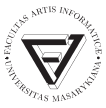PATAT 2006
The 6th International Conference
on the Practice and Theory of Automated Timetabling
Wednesday, 30th August - Friday, 1st September 2006
organized by the Faculty of Informatics, Masaryk University
Hotel International
Brno
Czech Republic
The conference proceedings is available here.
See some photos from the conference.
We have a few extra copies of the Proceedings of the conference, available for sale at 500 CZK (plus 300 CZK/order shipping).
This conference is the sixth in a series of conferences that serve as a forum for an international community of researchers, practitioners and vendors on all aspects of computer-aided timetable generation. For more information about the series of conferences see http://www.asap.cs.nott.ac.uk/patat/patat-index.shtml
The Featured Keynote Speakers for this conference are:
Barry McCollum
Queen's University and eventMAP Ltd., UK
University Timetabling: Bridging the Gap between Research and Practice
Michel
Gendreau
Centre de Recheche sur les Transports, Montréal,
Canada
Physicians Scheduling in Emergency Rooms
James
Orlin
MIT, USA
Very Large-Scale Neighborhood Search Techniques in Timetabling Problems
Andrea Schaerf
Università di Udine, Italy
Measurability and Reproducibility in Timetabling Research: State-of-the-Art
and Discussion
The themes of the conference include (but are not limited to):
- Educational Timetabling
- Transport Timetabling
- Employee Timetabling and Rostering
- Sports Timetabling
- Complexity Issues
- Distributed Timetabling Systems
- Experiences
- Implementations
- Commercial Packages
- Interactive vs Batch Timetabling
- Timetable Updating
- Data Models and Data Formats
- Relationship with Other Scheduling Problems
- Timetabling Research Areas, including:
- Constraint-Based Methods
- Evolutionary Computation
- Artificial Intelligence
- Graph Colouring
- Expert Systems
- Heuristic Search
- Knowledge Based Systems
- Operational Research
- Simulated Annealing
- Local Search
- Mathematical Programming
- Soft Computing
- Tabu Search
- Meta-Heuristics
- Hyper-Heuristics
- Very Large Neighborhood Search
- Ant Colony Methods
- Hybrid Methods
- Multi-Criteria Decision Making
- Fuzzy Reasoning
- Combinatorial Optimisation




